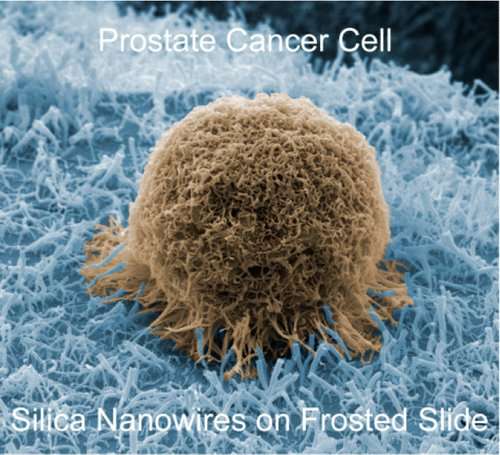Inexpensive detector is like 'Velcro' for cancer cells

Researchers have developed a new type of sensor that acts like Velcro for prostate cancer cells, sticking them to a modified frosted glass slide, like those used in science classes, so that they can be identified from blood samples. The low-cost method, reported in ACS Applied Materials & Interfaces, could help doctors better diagnose and monitor the disease.
In men with prostate cancer, some tumor cells exit the prostate gland and circulate in the blood. Detecting these cells could enable diagnosis at an earlier stage or help doctors assess whether treatment is effective. However, because circulating tumor cells are present in very small numbers, finding them can be a challenge. Previous sensors have been expensive and difficult to make. So Shudong Zhang and Shutao Wang wanted do develop a simpler, more cost-effective way to monitor prostate cancer cells in the blood.
The researchers based their device on frosted glass microscope slides, commonplace in high school science classes. The frosted area, which is used to hold and label the slide, is a sandblasted surface with tiny depressions. The researchers added a solution to the frosted slides that caused silica nanowires to grow on their surfaces, then they dangled antibodies that recognized prostate cancer cells from the nanowires. After getting captured by the antibodies, circulating tumor cells became trapped in the depressions on the slide and tangled up within the nanowires, similar to the interlocking surfaces of Velcro. The team could then visualize the cancer cells with microscopy, and found that the device had a capture efficiency on par with other approaches, they say. When the researchers tested blood samples from prostate cancer patients, the devices detected as few as 10 tumor cells in 1 milliliter of blood.
More information: Haijun Cui et al. Frosted Slides Decorated with Silica Nanowires for Detecting Circulating Tumor Cells from Prostate Cancer Patients, ACS Applied Materials & Interfaces (2018). DOI: 10.1021/acsami.8b06072
Abstract
Developing low-cost and highly efficient nanobiochips are important for liquid biopsies, real-time monitoring, and precision medicine. By in situ growth of silica nanowires on a commercial frosted slide, we develop a biochip for effective circulating tumor cells (CTCs) detection after modifying epithelial cell adhesion molecule antibody (anti-EpCAM). The biochip shows the specificity and high capture efficiency of 85.4 ± 8.3% for prostate cancer cell line (PC-3). The microsized frosted slides and silica nanowires allow enhanced efficiency in capture EpCAM positive cells by synergistic topographic interactions. And the capture efficiency of biochip increased with the increase of silica nanowires length on frosted slide. The biochip shows that micro/nanocomposite structures improve the capture efficiency of PC-3 more than 70% toward plain slide. Furthermore, the nanobiochip has been successfully applied to identify CTCs from whole blood specimens of prostate cancer patients. Thus, this frosted slide-based biochip may provide a cheap and effective way of clinical monitoring of CTCs.
Journal information: ACS Applied Materials and Interfaces
Provided by American Chemical Society



















